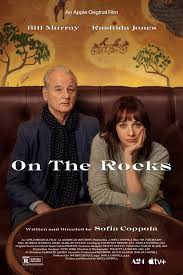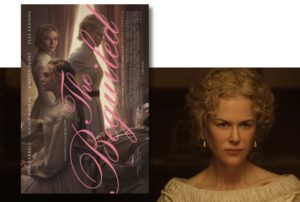On the Rocks
Posted on October 22, 2020 at 5:49 pm
B +| Lowest Recommended Age: | High School |
| MPAA Rating: | Rated R for some language and some sexual references |
| Profanity: | Strong language |
| Alcohol/ Drugs: | Social drinking |
| Violence/ Scariness: | None |
| Diversity Issues: | None |
| Date Released to Theaters: | October 24, 2020 |

I admit that I was about to give up on Sofia Coppola. I admired her early films, “The Virgin Suicides” and “Lost in Translation,” in part because of her exquisite framing and intriguing silences. But her later films made the framing seem precious and the silences seem empty. They were like precisely arranged bento boxes created for display only, beautiful to look at but not very nourishing or flavorful.
But now we have “On the Rocks,” a slight film but with more warmth and a more relaxed tone than her previous work. It’s bittersweet, but it is beguiling. Rashida Jones plays Laura, a writer in New York living with her husband Dean (Marlon Wayans) and two young children, one still a toddler. Dean has been working hard at his job, which requires a lot of travel, and Laura has been feeling neglected, struggling with her writing, and she begins to worry that Dean might be having an affair with the beautiful and a bit intimidating colleague who travels with him (Jessica Henwick and Fiona). While he is traveling the world and making big deals, she says, “I’m just the buzzkill waiting to schedule things.” And then, for her birthday, he gives her a kitchen appliance.
One reason Laura might be suspicious is her father, a charming and utterly unrepentant man about town, who has never been faithful to a partner, including Laura’s mother. But he loves Laura, and thinks the best way for him to help her is to help her follow Dean to find out for sure. She isn’t sure whether it’s better to find out that he is having an affair or finding out he is not having an affair but she has just become boring. “Ehst if we find out he is just busy and I’m in a rut?”
Laura’s father, Felix, is played by Coppola favorite Bill Murray, who worked with her in “Lost in Translation” and “A Very Murray Christmas.” The fun of the movie is seeing Jones and Murray together as they take us to one fabulous Manhattan location after another, to the sounds of the lush score from Phoenix. They adore each other, but there is strain between them. He betrayed her mother — and the woman who came after her, and many others. “Why do women get plastic surgery?” Felix asks Laura. “Because of men like you,” she says. He tells her he prefers women who have not had work done and she says he prefers all kinds of women. When he is stopped for speeding as they are following Dean, he utterly disarms the policeman by telling him he knew the cop’s father and grandfather. “It must be very nice to be you,” she says. He smiles, “I wouldn’t have it any other way.”
The plot barely exists, but like Laura and Felix, it is more about spending time together than answering the question about Dean. “On the Rocks” is like a lighter, sweeter Woody Allen film, a love letter to Manhattan, to music, to fathers and daughters, and to love itself.
Parents should know that the theme of this movie is adultery, including strong language and sexual references.
Family discussion: Why was Laura worried about Dean? Why didn’t she talk to him about her concerns?
If you like this, try; “Midnight in Paris” and “Celeste and Jesse Forever,” written by and starring Rasida Jones

